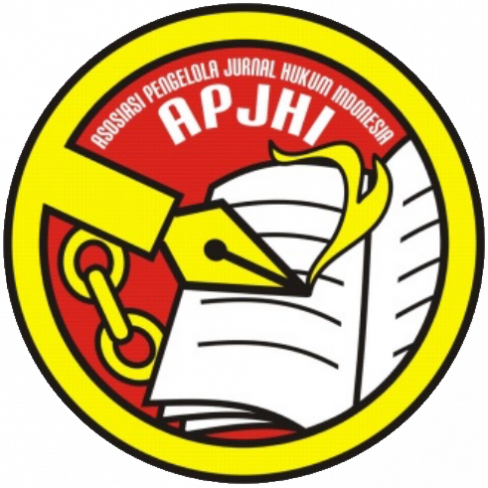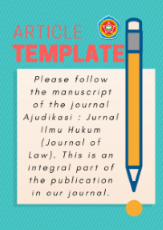Analisis Hukum Terhadap Penyampaian Informasi Elektronik yang Melanggar Norma Moral
DOI:
https://doi.org/10.30656/ajudikasi.v7i2.7665Keywords:
Law, Electronic, Information, Moral NormsAbstract
This research aims to analyze the legal aspects of electronic information dissemination that violates moral norms. The unethical dissemination of information, including hoaxes, hate speech, and other harmful behaviors, has become a significant concern in the digital environment today. The research method employed is normative legal research, utilizing three approaches: legislative, case-based, and conceptual. Research data were collected from secondary sources, including relevant laws and literature on legal issues related to electronic information dissemination. Additionally, tertiary data was derived from specific cases that exemplify the phenomenon of morally unethical information dissemination empirically, both within the digital space and outside the network. Data analysis involved stages of reading, note-taking, reduction, interpretation, and concluded with deduction. The research results outline the pertinent articles and sections within legal regulations concerning violations of moral norms in electronic information dissemination. Furthermore, the study discusses law enforcement measures that can be taken against the perpetrators of such violations. This research contributes to understanding the legal aspects related to morally unethical electronic information dissemination in the current digital era. It is essential to ensure that ethics and legal compliance are maintained in the increasingly complex online environment.
Downloads
References
APJII. (2022). Profil Internet Indonesia 2022. SRA Consulting., 1–104.
Berkah, R. S., Kusumawati, A., & Atmadja, H. T. (2022). Legal Protection for Victims of Cyberbullying: An Assessment of the Role of Social Media and Responsibilities of Service Providers. POSTULAT, 1(2), 95–100. https://doi.org/10.37010/postulat.v1i2.1272
Darmawansyah, A. (2023). PERLINDUNGAN HUKUM PORNOGRAFI MELALUI MEDIA SOSIAL DI INDONESIA. Jurnal Fakta Hukum (JFH), 1(2), 35–58. https://doi.org/10.58819/jurnalfaktahukum(jfh).v1i2.62
Didi Maslan, Mardianto, & Muhammad Irwan Padli Nasution. (2023). Pendidikan Etika Bermedia Sosial Dalam Perspektif Islam: Antara Dosa Jariyah Dan Pahala Jariyah. Al-Ittishol: Jurnal Komunikasi Dan Penyiaran Islam, 4(2), 155–176. https://doi.org/10.51339/ittishol.v4i2.1041
DISEMADI, H. S. et al. (n.d.). Perlindungan Data Pribadi di Era Digital: Mengapa Kita Perlu Peduli? Sang Sewagati Journal, 1(2), 66–90. https://journal.uib.ac.id/index.php/sasenal/article/view/8579%3E. Date accessed: 11 nov. 2023. doi: http://dx.doi.org/10.37253/sasenal.v1i2.8579.
Eimhjellen, I. (2023). Capital, Inequality, and Volunteering: A Bourdieusian Perspective. Voluntas, 34(3), 654–669. https://doi.org/10.1007/s11266-022-00501-7
Hidayat, B. D., Surono, A., & Hidayati, M. N. (2021). UJARAN KEBENCIAN PADA MEDIA SOSIAL PADA SAAT PANDEMI COVID-19 STUDI KASUS PUTUSAN No.72/PID.SUS/2020/PT.DPS. Jurnal Magister Ilmu Hukum, 6(2), 23–44. https://doi.org/10.36722/jmih.v6i2.836
Hosnah, A. U., Djakarsih Putro, S. H., & Azis, U. A. (2020). The Implementation of Noodweer Exceeds to Perpetrators of Murder in the Practice of Criminal Justice Practices in Indonesia. International Journal of Multicultural and Multireligious Understanding, 7(2), 540. https://doi.org/10.18415/ijmmu.v7i2.1523
Kumalasari, V. (2021). Etika Profesi Dalam Bidang Teknologi Informasi. Yayasan Prima Agus Teknik.
Mbembe, A. (2019). Out of the Dark Night. Columbia University Press. https://doi.org/10.7312/mbem16028
Muhammad Fikri, & S. R. (2023). RUANG LINGKUP PERLINDUNGAN DATA PRIBADI: KAJIAN HUKUM POSISTIF INDONESIA. Ganesha Law Review, 5(1), 39–57. https://ejournal2.undiksha.ac.id/index.php/GLR/article/view/2237
Mursyida, A. K., Mahendra, Y. T., & Saputra3, D. (2023). Literasi Digital Literasi Digital Sebagai Upaya Menangkal Hoax di Lingkungan Masyarakat Indonesia. Jurnal Tonggak Pendidikan Dasar, 2(1), 36–48.
Muttaqien, F. A., & Irawan, A. D. (2021). Penerapan Hukum Pidana Penyebaran Berita Hoax Melalui Media Sosial Era Pandemi Covid-19. Media of Law and Sharia, 2(4), 305–315. https://doi.org/10.18196/mls.v2i4.12016
Rahayu, S. T. W., & Ruisah, R. R. (2020). Pelanggaran UU ITE pada Media Sosial dalam Etika Komunikasi Massa. INTERAKSI PERADABAN: Jurnal Komunikasi Dan Penyiaran Islam, 1(1), 69–82. https://doi.org/https://doi.org/10.15408/interaksi.v1i1.20885
Razali, G., Retu, M. K., Rifai, A., Zumiarti, Hanika, I. M., Mendri, N. K., Badi’ah, A., Meliala, A. J., Herawati, K. M., Satory, A., Djerbu, D., & Nugraha, R. S. (2020). Ilmu Komunikasi dan Informasi dan Transaksi Elektronik. CV Media Sains Indonesia.
Rohmy, A. M., Suratman, T., & Nihayaty, A. I. (2021). UU ITE Dalam Perspektif Perkembangan Teknologi Informasi dan Komunikasi. Dakwatuna: Jurnal Dakwah Dan Komunikasi Islam, 7(2), 309–339. https://doi.org/10.54471/dakwatuna.v7i2.1202
Santoso, A. B. (2023). REKONSTRUKSI REGULASI KEWENANGAN PENYIDIK PEGAWAI NEGERI SIPIL TERTENTU DALAM PENYIDIKAN TINDAK PIDANA BEA CUKAI BERBASIS. Universitas Islam Sultan Agung.
Schaefer, D. O. (2022). Wild Experiment: Feeling Science and Secularism After Darwin. Duke University Press. https://doi.org/10.1080/17432200.2023.2221581
Solihin, D., Kumala Dewi, C., Masithoh Haryadi, R., & Irwan, S. (2023). Pelatihan Kewirausahaan Berbasis Ekonomi Digital Untuk Pelaku UMKM. Jurnal Abdimas Lamin, 1(2), 191–201.
Suryarandika, R., & Saubani, A. (2023). Sidang Kasus Pencemaran Nama Baik Luhut, Haris Azhar: Pembuktiannya Gaya Adu Domba. News.Republika.Co.Id.
WICAKSONO, R. S. (2023). Criminal Trafficking Of Counterfeit Money (Analysis Of Court Decisions Number: 1752/Pid. B/2015/PKT. PST). UIN Syarif Hidayatullah.
Wisnubroto, K., Nuraini, R., & Sari, E. I. (2022). Bijak Bermedsos agar tidak Tersandung UU ITE. Indonesia.Go.Id.
Young, K. M., & Billings, K. R. (2020). Legal Consciousness and Cultural Capital. Law and Society Review, 54(1), 33–65. https://doi.org/10.1111/lasr.12455
Zulfikar, F. (2023). 10 Negara dengan Pengguna Internet Tertinggi di Dunia, Indonesia Nomor Berapa? Detik.Com.
Downloads
Published
Issue
Section
License
Authors who publish with this journal agree to the following terms:
Authors retain copyright and grant the journal right of first publication with the work simultaneously licensed under a Creative Commons Attribution License that allows others to share the work with an acknowledgment of the work's authorship and initial publication in this journal.
Authors can enter into separate, additional contractual arrangements for the non-exclusive distribution of the journal's published version of the work (e.g., post it to an institutional repository or publish it in a book) with an acknowledgment of its initial publication in this journal.
Authors are permitted and encouraged to post their work online (e.g., in institutional repositories or on their website) before and during the submission process, as it can lead to productive exchanges and earlier and greater citation of published work.
All articles in Ajudikasi : Jurnal Ilmu Hukum can be disseminated provided they include the identity of the article and the source of the article (Ajudikasi : Jurnal Ilmu Hukum). The publisher is not responsible for the contents of the article. The content of the article is the sole responsibility of the author
Ajudikasi : Jurnal Ilmu Hukum is lincensed under a Creative Commons Attribution-ShareAlike 4.0 International License.









1.png)
.png)
.png)





.png)
.png)
.png)
.png)





.png)







